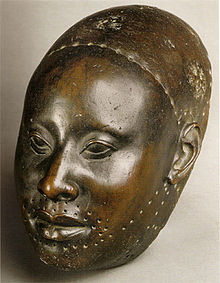



| Part of a series on |
| Yorùbá people |
|---|
 |
The Ooni of Ile-Ife (Ọọ̀ni of Ilè-Ifẹ̀) is the traditional ruler of Ilé-Ifẹ̀ and the spiritual head of the Yoruba people. The Ooni dynasty existed before the reign of Oduduwa which historians have argued to have been between the 7th-9th centuries A.D.
After the demise of Oduduwa and Ogun’s loss of the throne, Oduduwa's support base dispersed out of Ile-Ife. Another account but not in tandem with existing evidences states that Ogun purposely sent all Oduduwa's children on different journeys to effect Yoruba territory expansion.
Whatever the case, after Oduduwa's short reign, Ọbàtálá re-emerged as the king of Ile-Ife and the throne was rotated between Obatala and Obalufon houses until the return of Oranmiyan who briefly interrupted the succession pattern. Popular history identifies Ooni Lajamisan to have been a son or grandson of Oranmiyan. Meanwhile Ife tradition remains unclear about his ancestry. Lajamisan is often said to have opened the modern Ife history.
Prior to the 20th century, the succession pattern of the Ooni was fluid. However, with the modernity that came with colonialism, the succession pattern was structured to the existing four actual Ruling Houses[1] are named from Ooni Lafogido, Ooni Osinkola, Ooni Ogboru and Ooni Giesi. The structure has been heavily critiqued for being influenced by politics, personal vendetta and obfuscation of history. For instance, while the first three were said to have been sons of Ooni Lajodogun, certain figures regarded as siblings of Ogboru have either been completely excluded or subsumed. The current Ooni is Adeyeye Enitan Ogunwusi Ojaja II (born October 17, 1974).
- ^ "The Place Of Oranmiyan In The History Of Ile – Ife". Vanguard. 2016-02-22. Retrieved 2016-04-20.